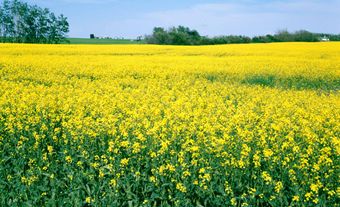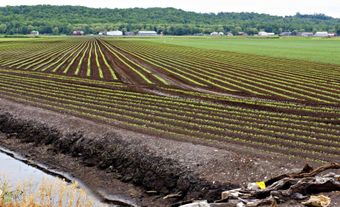Potato wart disease, also called potato canker, is a fungal disease of potato sprouts, eyes and stolons. The disease is caused by the soil-borne fungus, Synchytrium endobioticum. Potato wart disease poses no danger to human health or food safety, but it can impact local economies as the disease can reduce yield and effect economic regulations, such as potato exports. (See also Agricultural Economics.)
Potato Wart Disease
Potato wart disease, also called potato canker, is a fungal disease of potato sprouts, eyes and stolons. It does not affect roots. The disease is primarily a disease of kitchen gardens where potatoes are cropped continuously; it is spread through the distribution of contaminated soil and potatoes, in droppings from animals fed infected potatoes, digging implements, footwear, etc. It is distributed worldwide, mainly in cool, moist environments.
The disease-causing agent is a single-celled organism called Synchytrium endobioticum, a fungus (Chytridiomycetes) with a complicated life history. The most obvious symptoms of disease are soft, cauliflowerlike proliferations of tissue surrounding the infected cells. These warts or cankers are white at first but may become green if they enlarge and are exposed to light above the soil line. Eventually, wart tissue darkens and rots to release thick walled, persistent spores that can live for up to 40 years in the soil. As chemical control of potato wart is extremely difficult and may harm beneficial soil organisms, resistant varieties of potato are bred to control the disease. Alternatively, infested land is taken out of production.
Potato Wart Disease in Canada
In North America, the disease was first detected in Newfoundland in 1909 by Dominion botanist H. Güssow. In 1912, legislation forbade the movement of Newfoundland soil and produce into Canada. This quarantine is still in effect, and ground transport leaving the island of Newfoundland is checked for the presence of soil or prohibited materials.
As of 2000, the disease has been detected 34 times in Prince Edward Island and has been the subject of extensive inspection and control measures by the Canadian Food Inspection Agency. The latest detection of potato wart disease occurred in October 2021, which halted the domestic and international movement of seed potatoes from PEI. (See also International Trade.)
Detection and Prevention
The Canadian Food Inspection Agency monitors and manages potato wart disease, which is regulated under the Plant Protection Act. In 2000, the Potato Wart Domestic Long Term Management Plan was established to manage and prevent the spread of potato wart disease. The plan overviews survey, testing and surveillance requirements.

 Share on Facebook
Share on Facebook Share on X
Share on X Share by Email
Share by Email Share on Google Classroom
Share on Google Classroom








